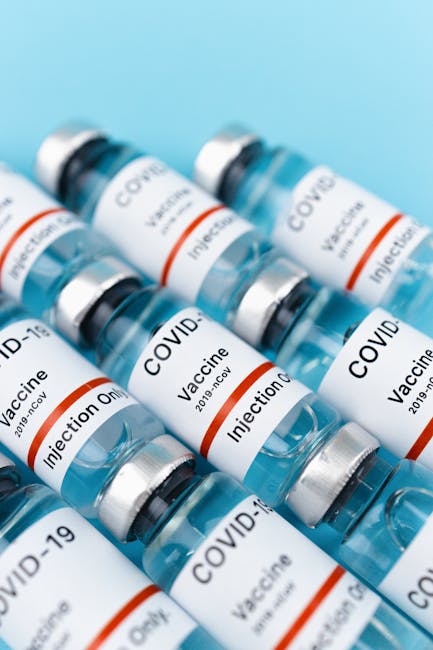Understanding the FDA’s Role in COVID-19 Vaccine Authorization
The Food and Drug Administration (FDA) plays a crucial role in ensuring the safety and efficacy of all vaccines available in the United States, including those for COVID-19. Their rigorous process involves multiple phases of review, testing, and analysis before granting Emergency Use Authorization (EUA) or full licensure. This comprehensive guide will delve into the FDA’s process, address common concerns, and provide clarity on the safety and efficacy data behind the authorized COVID-19 vaccines.

The FDA’s Vaccine Authorization Process
The FDA’s authorization process for COVID-19 vaccines, initially through EUAs and subsequently through full licensure, was expedited but not compromised. This accelerated timeline was necessary to combat the rapidly spreading pandemic, but the agency maintained its commitment to rigorous scientific standards. The process generally includes:
- Pre-clinical testing: Laboratory and animal studies to assess safety and potential efficacy.
- Phase 1 trials: Small-scale human trials to evaluate safety, dosage, and initial immune responses.
- Phase 2 trials: Larger-scale trials to further assess safety, determine optimal dosage, and explore different vaccine regimens.
- Phase 3 trials: Large-scale, randomized, controlled trials to confirm efficacy and monitor side effects in a diverse population.
- Data review and analysis: The FDA’s independent experts thoroughly examine all data submitted by vaccine manufacturers. This includes safety data, efficacy data, and manufacturing processes.
- Emergency Use Authorization (EUA) or Full Licensure: Based on the reviewed data, the FDA grants either an EUA (for use during a public health emergency) or full licensure (after more comprehensive data is available).
EUA vs. Full Licensure
The FDA initially granted EUAs for COVID-19 vaccines, enabling their rapid deployment during the pandemic. An EUA allows the use of a medical product when there is a significant public health threat and the potential benefits outweigh the known and potential risks. Full licensure, on the other hand, requires more extensive data, demonstrating longer-term safety and efficacy. The transition from EUA to full licensure reflects the accumulation of substantial post-market surveillance data, confirming the vaccines’ continued safety and efficacy.
Addressing Common Concerns about COVID-19 Vaccines
Many concerns have been raised regarding the safety and efficacy of COVID-19 vaccines. Let’s address some of the most prevalent:
Safety Concerns:
- Rare but serious side effects: While rare, some serious side effects, such as myocarditis (inflammation of the heart muscle) and pericarditis (inflammation of the lining around the heart), have been reported, predominantly in young men after receiving mRNA vaccines. The FDA continues to monitor and investigate these events. The benefits of vaccination still significantly outweigh the risks for most individuals.
- Long-term effects: Long-term effects are still under investigation, but extensive post-market surveillance is underway to track any potential long-term issues. Currently, no significant long-term safety concerns have emerged.
- Allergic reactions: Allergic reactions are possible, but they are rare and typically occur soon after vaccination. Individuals with known allergies should discuss potential risks with their healthcare provider.
Efficacy Concerns:
- Variants: The efficacy of vaccines against different variants of the virus may vary. Booster shots are often recommended to address emerging variants and maintain a high level of protection.
- Vaccine effectiveness waning over time: Vaccine effectiveness may wane over time, highlighting the importance of staying updated with booster shots as recommended by public health authorities.
The Importance of Vaccination
Despite concerns, the overwhelming scientific evidence demonstrates that COVID-19 vaccines are safe and highly effective at preventing severe illness, hospitalization, and death. Vaccination remains a crucial public health strategy in mitigating the impact of COVID-19 and protecting individuals and communities.

Staying Informed and Engaging with Your Healthcare Provider
It’s essential to stay informed about COVID-19 vaccines and to discuss any concerns with your healthcare provider. The FDA website provides comprehensive information on authorized vaccines, including safety data, efficacy data, and ongoing surveillance efforts. Your healthcare provider can assess your individual risk factors and help you make informed decisions regarding vaccination.
Conclusion
The FDA’s rigorous authorization process for COVID-19 vaccines ensured that these vaccines met high standards for safety and efficacy. While rare side effects have been reported, the benefits of vaccination continue to far outweigh the risks for the vast majority of individuals. Staying up-to-date on vaccination recommendations and consulting with your healthcare provider is critical in protecting yourself and your community from the ongoing threat of COVID-19.


